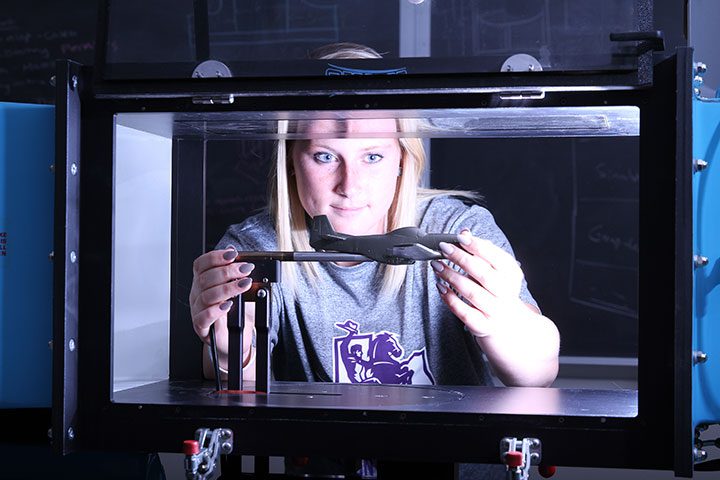Mechanical Engineering (Bachelor of Science)
Prepare for industry, licensure and graduate studies in mechanical engineering or related disciplines such as mathematics and physics. Our bachelor’s degree in mechanical engineering is a rigorous, hands-on program offering real-world experiences, as well as faculty and peer mentorship, to develop ethical scholars and leaders with technical and innovative problem-solving and design skills.
Small class sizes offer plenty of opportunities for peer interaction, undergraduate research and project building, while multi-million-dollar facilities support the curriculum with equipment and resources comparable to large, top-tier research universities.
After completing the degree program, you’ll be qualified to become a registered professional engineer in any state. For those in consulting or private practice, licensure is essential and necessary for the approval and seal of engineering work.
What is Mechanical Engineering?
Mechanical engineers design and implement innovative, real-world solutions to complex problems related to mechanical, thermal and fluid systems by applying principles of engineering, science and mathematics. They also consider public health, safety and welfare, as well as global, cultural, social, environmental and economic factors.
In today’s world of rapid change, innovations and advancements in mechanical engineering are continuously needed to strengthen the quality of life by making it safer, more enjoyable and more productive. We educate and train highly skilled and experienced mechanical engineers to meet growing workforce needs in Texas and the United States.
What Can You Do With Your Bachelor’s Degree in Mechanical Engineering?
A bachelor’s degree in Mechanical Engineering will open doors to exciting careers in engineering for almost any industry, including petroleum, aerospace, defense, nuclear power, automotive, manufacturing, energy and power, robotics and mechatronics, consulting and HVAC.
Graduates will possess the in-depth knowledge, skills and mindset needed to design innovative solutions, experiment with modern analytical tools and techniques, communicate professionally and work in a team environment — all marketable skills for mechanical engineering jobs.
The mechanical engineering bachelor’s degree can also lead to graduate school. You may be interested in specializing with an advanced degree in a mechanical engineering or in a mechanical-related field such as biomedical engineering, aerospace engineering, petroleum engineering or physics.

Estimated Completion
128 Credit Hours (4 years)
View the suggested coursework by year
Application Process
Cost
Locations Available
College
Careers in Mechanical Engineering
Nearly 100% of mechanical engineering graduates were accepted into graduate school or work in industry for employees such as Raytheon, TechnipFMC, BNSF and Halff Associates. Most accepted a job offer before graduation.
How Much Do Mechanical Engineering Graduates Make?
The median annual wage for mechanical engineers was $87,370 in May 2018, according to the U.S. Bureau of Labor Statistics.
Why Major in Mechanical Engineering?
While earning your degree in mechanical engineering, you’ll participate in practical, hands-on, real-world learning experiences, such as internships and undergraduate research. Many of these opportunities involve collaboration with local manufacturers and industry professionals that can lead to jobs or graduate school after graduation.
What Classes Will You Take as a Mechanical Engineering Major?
Our mechanical engineering curriculum focuses on design and development in a wide variety of areas, including mechanical, fluid and thermal technologies, robotics and mechatronics control systems and alternative energy systems. Additional studies in ethics and professionalism will develop your ability to understand your responsibilities as a mechanical engineer and the role of mechanical engineering in meeting human needs.
The mechanical engineering bachelor’s degree program is also designed to provide the opportunity to minor in electrical engineering with the addition of two courses, typically Signals and Systems and Electronics. This gives you a competitive edge by adding a breadth of content that complements electromechanical system design.
The coursework culminates in a two-semester capstone design experience in which you’ll work on a team to develop a design project from inception to final prototype. Many of these capstone projects are industry driven, providing mechanical engineering majors with real-world experience and industry connections.
View all required classes for the mechanical engineering bachelor’s degree program.
How Do You Get Started on Your Bachelor’s of Mechanical Engineering?
Take the next step toward earning your bachelor’s degree in mechanical engineering. We have the resources to help you get started.
Accreditations
- Southern Association of Colleges and Schools Commission on Colleges (SACSCOC)
- The Mechanical Engineering (MEEN) program at Tarleton State University is accredited by the Engineering Accreditation Commission of ABET, under the General Criteria and the Mechanical Engineering Programs Criteria. The accreditation action was retroactive on October 1, 2017. View ABET status and information.
Mechanical engineering majors are doing amazing things with their senior design projects. For example, one student teamed up with an electrical engineering major to design and prototype a medical device that provided an advanced treatment option for various disorders and conditions. They now have a patent-pending device and have created the startup company, Alaria Biotech.
Another team had their senior design prototype selected for production as a field tool for FMC Technologies. Other teams are working on projects with industry leaders such as Raytheon. These industry-based projects often lead to job offers for the students.Mechanical engineering majors are doing amazing things with their senior design projects.
For example, one student teamed up with an electrical engineering major to design and prototype a medical device that provided an advanced treatment option for various disorders and conditions. They now have a patent-pending device and have created the startup company, Alaria Biotech.
Another team had their senior design prototype selected for production as a field tool for FMC Technologies. Other teams are working on projects with industry leaders such as Raytheon. These industry-based projects often lead to job offers for the students.
What Bachelor’s Degrees are Related to Mechanical Engineering?
- Civil Engineering (Bachelor of Science)
- Environmental Engineering (Bachelor of Science)
- Computer Science (Bachelor of Science)
- Mechanical Engineering Technology (Bachelor of Science)
- Manufacturing Engineering Technology (Bachelor of Science)






